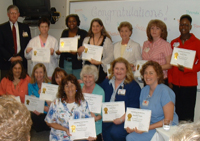Employees are MUSC’s ‘Keys to
Success’
Co-workers
who voluntarily helped new employees get oriented to their new jobs at
MUSC were recognized at the first Keys to Success ceremony on May 11.
The ceremony is expected to become an annual event.Ambulatory Care Services recognized 19 preceptors, or coaches, in its annual Key to Success Preceptor Recognition Program for going above and beyond their own job responsibilities and adopting the task of helping new staff members transition into their roles.
 Front row from left
are Patty Tisdale, Paula Sutton, Marie Simons, Brenda Kramer, Martha
Moore, Susan Oman, Jacqueline Tepper. Back row from left are Dave Neff,
administrator of Ambulatory Care Services, Julie Klopp, Melissa Dingle,
Debbie Cepeda, Dianne Griffin, Valerie Knight, Senika Walker. Not
pictured are Mary Adler, Joan deRhodo, Nancy Goodwin, Mary Johnson,
Melanie Mones, and Tia White.
Front row from left
are Patty Tisdale, Paula Sutton, Marie Simons, Brenda Kramer, Martha
Moore, Susan Oman, Jacqueline Tepper. Back row from left are Dave Neff,
administrator of Ambulatory Care Services, Julie Klopp, Melissa Dingle,
Debbie Cepeda, Dianne Griffin, Valerie Knight, Senika Walker. Not
pictured are Mary Adler, Joan deRhodo, Nancy Goodwin, Mary Johnson,
Melanie Mones, and Tia White. The preceptor program, developed about 30 years ago to help new nurses adjust to their new jobs, expanded recently to include clinical and administrative staff, said the program’s developer, Mary Elizabeth Canaday, staff development and education specialist.
“Because new employees are more quickly oriented to their jobs and environment, employee morale improves, staff retention is increased, and the results are enhanced patient care,” Canaday said.
While some new employees are nurses, others work in scheduling and financial services, and administration. Preceptors may or may not be supervisors, but “They are highly motivated employees who have performed well,” said David Neff, Ambulatory Care Services administrator.
Neff said that preceptors helped save money in orientation and training. “Preceptors train a new employee and help socialize him or her into the environment so well that the new employee has greater satisfaction,” Neff said. “The employee will be happier, more productive, and will want to stay with us much longer.”
In fact, since the program began, Canaday said the retention rate by new employees who benefited from the Keys to Success assistance has nearly quadrupled.
“In the past, we would send out questionnaires to new employees after they had been here for about four months. We wanted to see how things were going, so we would know what needed to be modified in employee orientation and training,” Canaday said. “Out of about 50 new employees, about 25 percent of those people were no longer here. That was in four months. They didn’t even wait until six months. This was before the preceptor program.”
During the most recent survey of 52 new employees, only four had left MUSC after four months, Canaday said. “We’ve improved retention; no doubt about that,” she said.
Canaday said she did not know how many other medical centers or companies also have such a program, but she suspects the program is unique to MUSC, which began the program in the 1970s. The difference at MUSC is administrative and registration staff are included into the program, whereas most preceptor programs have a clinical basis.
Qualifications for Keys to Success recipients included individuals that:
- attended the basic preceptor class within the past three years;
- had coached others in an exemplary manner with an emphasis on new employee retention, patient care and paperwork completion; and
- had been nominated by their managers for their outstanding efforts.
“She is never too busy to show new things, sit down and follow through on orientation paperwork and encourage our new orientees and make them feel like part of the team.”
“She is always available to precept our new employees. She spends countless hours on individual training sessions and orientation sessions with new employees. She is approachable and has a smile and personality that would make anyone feel right at home in Ambulatory Care. She is a great ambassador for our department.”
“She takes great pride in orienting new employees to her area. The last new hire she worked with has done an excellent job and got on the phones very easily and quickly …thanks mainly to this preceptor’s great patience and assistance.”
“She is a key factor in employee satisfaction. She is friendly, approachable and welcoming to new employees. She is patient-centered and has an intense desire for her staff to succeed.”
As recognition, each preceptor was presented with a certificate by Shannon Ravenel, director of Administrative Services, and Sherry Gillespie Miller, R.N., director of Clinical Services. Neff gave each a pin in the form of a key on which the words, “I am the key to success,” is engraved on it.
The preceptors honored were: Mary Adler, R.N., Debbie Cepeda, Joan deRhodo, R.N., Melissa Dingle, Nancy Goodwin, Dianne Griffin, Mary Johnson, Julie Klopp, R.N., Valerie Knight, Brenda Kramer, Melanie Mones, R.N., Martha Moore, Susan Oman, Marie Simons, Paula Sutton, Jacqueline Tepper, Patty Tisdale, Senika Walker, and Tia White.
Friday, June 2, 2006
Catalyst Online is published weekly,
updated
as needed and improved from time to time by the MUSC Office of Public
Relations
for the faculty, employees and students of the Medical University of
South
Carolina. Catalyst Online editor, Kim Draughn, can be reached at
792-4107
or by email, catalyst@musc.edu. Editorial copy can be submitted to
Catalyst
Online and to The Catalyst in print by fax, 792-6723, or by email to
catalyst@musc.edu. To place an ad in The Catalyst hardcopy, call Island
papers at 849-1778, ext. 201.